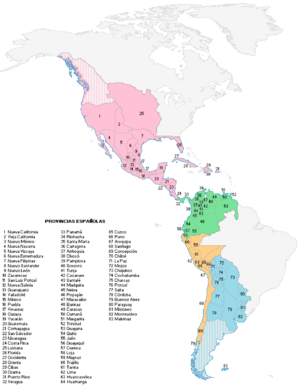Provincial deputation in Spanish America facts for kids
Quick facts for kids Provincial Deputation |
|
|---|---|

American Provinces of Spain in 1800
|
|
| Number | 20 (1812) |
The Provincial Deputation was a new type of local government. It was created by the Spanish Constitution of 1812. This new system aimed to represent the different regions of Spain and its American lands.
Before this, the Spanish government had ruled its American territories as colonies. But a special group, the Supreme Central Junta, said these lands were actually part of Spain. This change meant they deserved more local control.
The Provincial Deputations allowed regions to manage their own affairs. This was especially important for areas in America that were rebelling. It helped them keep local power while staying connected to the larger Spanish Empire.
The word "province" meant different things to different people. In America, it often meant a small area. But in Europe, it could mean a very large region, like a kingdom. The Spanish government decided that a province would be the same as an "Intendancy."
With the new constitution, the old system of viceroyalties was removed. Instead, each province had a Jefe Político (political chief). This chief was chosen by the main government in Spain. Each province also had a Diputación Provincial (provincial council). This council had seven members who were chosen by the people.
However, this system did not last long. When the king returned to power in Spain in 1814 and 1823, the old viceroyalties came back. The new provinces disappeared. By 1825, most of Spain's American lands had become independent countries. Only Cuba, Puerto Rico, and the Philippines remained under Spanish rule.
American Provinces Under the 1812 Spanish Constitution
In 1812, a group of American representatives suggested increasing the number of American provinces. They wanted twenty provinces, and this idea was approved. Later, these representatives asked for even more smaller divisions.
In 1820, during a period called the Trienio Liberal, the Spanish government agreed. They decided to turn all "Intendancies" into provinces. However, many of these new provinces were only names on a map. This was because many territories were already part of new, independent Spanish-American countries.
Each of these provinces reported directly to the government in Madrid. They were independent of each other. Each province was further divided into smaller areas called "partidos." These smaller areas were led by Jefes Políticos Subalternos (sub-level political chiefs).
| Province | Jurisdictional territories | Capital |
|---|---|---|
| Province of New Spain [es] |
|
Mexico City |
| General Command of the Internal Provinces of the East | Monterrey | |
| General Command of the Internal Provinces of the West | Durango | |
| San Luis Potosí |
|
Guanajuato |
| Intendancy of Guadalajara [es] |
|
Guadalajara |
| Captaincy General of Yucatán | Mérida | |
| Province of Guatemala [es] |
|
Guatemala |
| Province of Nicaragua and Costa Rica [es] |
|
León |
| Captaincy General of Cuba |
|
La Habana |
| Captaincy General of Puerto Rico | San Juan | |
| Cuba |
|
Santiago de Cuba |
| Captaincy General of Santo Domingo | Santo Domingo | |
| Captaincy General of Venezuela |
|
Caracas |
| New Kingdom of Granada |
|
Santa Fe |
| Province of Quito [es] | Quito | |
| Province of Lima |
|
Lima |
| Province of Cuzco | Cuzco | |
| Province of Chile |
|
Santiago |
| Province of Río de la Plata |
|
Buenos Aires |
| Upper Peru |
|
Chuquisaca |
See also
 In Spanish: Provincias españolas en América para niños
In Spanish: Provincias españolas en América para niños
 | Janet Taylor Pickett |
 | Synthia Saint James |
 | Howardena Pindell |
 | Faith Ringgold |

